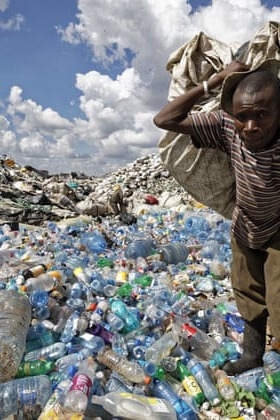Plastic waste does not exist

A few facts about plastic
Plastic has a bad reputation, despite the fact we all make use of it every day. Since the start of its mass-production in the 50s, the amount produced and used is increasing constantly. Of all the plastic ever manufactured, only 9% has been recycled. A large portion is incinerated or dumped in landfills and enormous amounts end up in the environment, not only impacting wildlife but also human health. It is predicted that we will continue to produce and consume more plastics than we do today, and without smarter use of the existing amounts of plastics, the consequences to our environment will be irrevocable.
In 1869 John Wesley Hyatt invented the first synthetic polymer, a substitute for ivory. Humans were now capable to create new materials other than materials from natural products. In 1907 Leo Baekeland invented the first fully synthetic plastic (Bakelite) which could be shaped in almost everything.
Mass production of various newly invented plastics, commenced in the 1950’s (1.5 million ton per year), which seriously changed our lives (cell phones, computers, cars, domestic products, packaging for food and products and much more). In 2018 global production increased to an enormous 381 million tons per year.
Sadly, humans dispose disused plastics irresponsibly and this created its regrettable reputation, mainly caused by trashing polyethylene bags, polystyrene food containers and PET drink bottles which take decades to degrade.
Plastic debris in the Oceans were first observed in 1960’s, a result of abandoned plastics ending up in rivers such as the Yangtze, Indus, Yellow, Hai, Nile, Ganges, Pearl, Amur, Niger and Mekong which transport 88% to 95% of the global plastic waste to the oceans which caused the first concerns. The anxiety about the waste increased. In the 80’s the plastic industry started initiatives together with municipalities to collect and process recyclable materials, but most plastic waste still ends up in landfills (25% in Europe in 2018) or is being incinerated (43% in Europe in 2018) and this contributes directly to global warming.
The “Great Pacific Garbage Patch”, in size comparable to the combined area of the Benelux, Germany, France, Spain and Portugal weighs about 80.000 ton and increases with 8 million tons per year.
Research estimated that of the total of 8.3 billion tons of virgin plastic produced up to now, only 9% has been recycled.
In 2019 it was estimated that the production and incineration of plastic added 850 million tons of greenhouse gasses in the atmosphere and this figure shall grow exponentially if plastics are not recycled.
Over 20 years ago
a chemical engineer recognized the challenges of recycling different types of plastics and came up with an idea that made it possible to mix waste plastics with different properties into a homogenous mass suitable to make strong and durable products.
It took more than 15 years to improve the concept and optimize the process on an industrial scale. In 2016 the first full-size operation started in the Netherlands. Only a few years later a new factory was opened, annually processing up to 24.000 tons of mixed plastic waste producing road plates and pallets.
World-wide patented technology
Recycling and reusing plastic waste is increasing and many companies recycle and reuse plastic waste to make new products. Unfortunately, less than half of the plastics produced are suitable to be recycled using the latest available technologies. PlastibriQ makes it possible to process ALL plastic waste, especially plastic waste from domestic and environmental waste streams, and produce durable, long-lasting, tough and circular products.